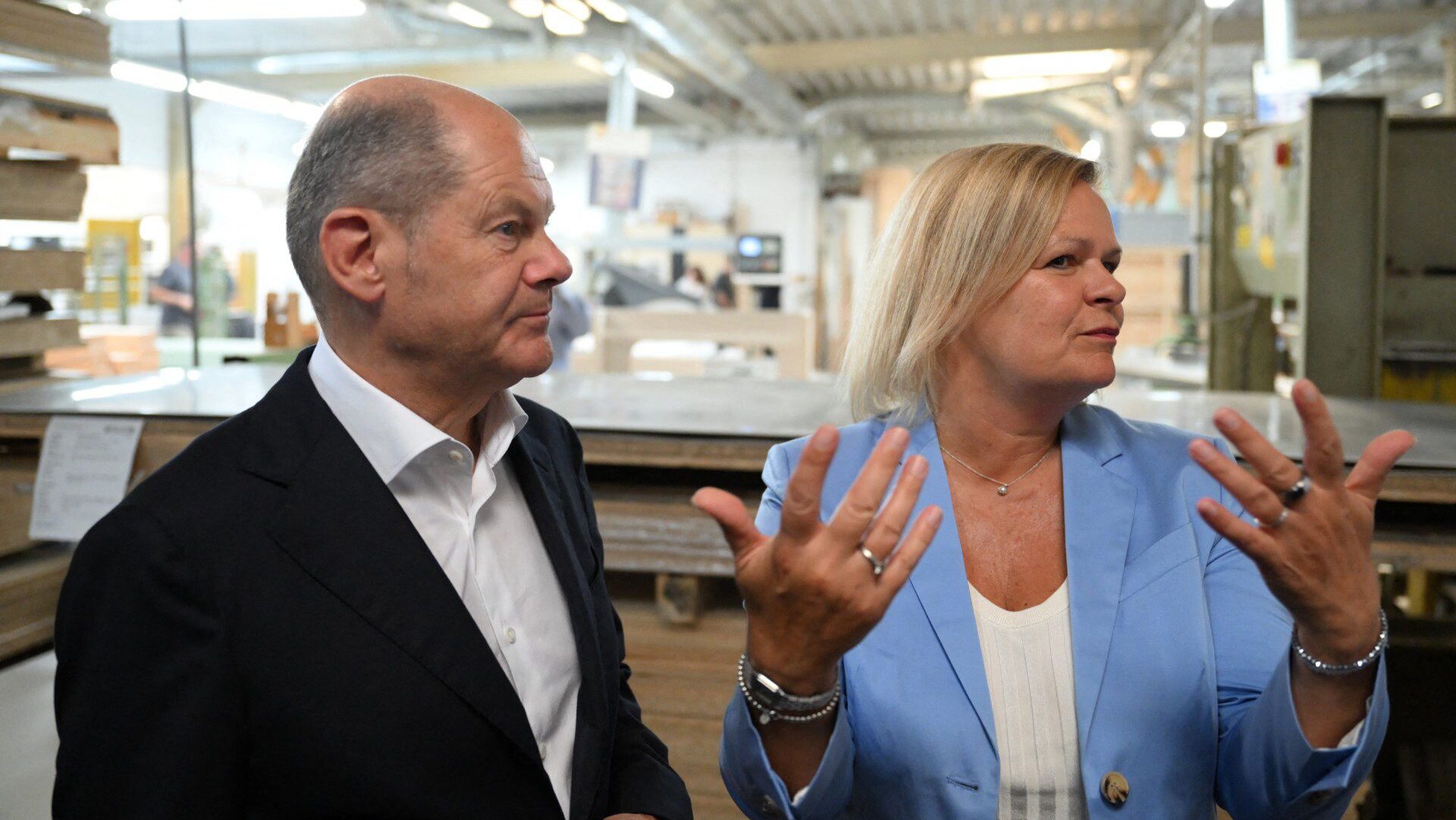
German Interior Minister Nancy Faeser (R) and German Chancellor Olaf Scholz visit carpentry Kramwinkel in Muehlheim on August 11, 202308
Photo: Kirill KUDRYAVTSEV / AFP
State elections in Bavaria and Hesse this Sunday, October 8th, will not just impact local politics but will also signal the mood in the whole of Germany after almost two years of leftist-liberal-green governance in Berlin. The social democrats (SPD), the Greens, and the liberal FDP have been taking a beating in the polls, as people get fed up with the mismanagement of the cost-of-living crisis, the economic effects of the war in Ukraine, and the migration crisis.
The elections in the southern state of Bavaria and the western state of Hesse will be the last meaningful votes in Germany before the European elections next summer, so they provide a chance for citizens to voice their opinion, as Olaf Scholz’s ever-bickering coalition reaches the halfway point of its term in office. Polls indicate that there won’t be meaningful changes, but that Germany has indeed shifted somewhat to the right.
In Bavaria, the largest and one of Germany’s wealthiest states, centre-right CSU, which has governed the state continuously since 1957, will most likely maintain its vote share of 37%, the result it got in elections five years ago, and Markus Söder will stay on as prime minister.
Die meisten Gesamtstimmen kommen nach diesem Stimmungsbild erneut für die @CSU zustande. Ähnlich wie in Hessen, sind die Abstände zwischen drei Parteien klein: @fw_bayern, @Gruene_Bayern und #AfD stehen ähnlich da. Mehr dazu: https://t.co/TJyB2gamSi #ltwby pic.twitter.com/IwMwKQKrgc
— Wahlkreisprognose (@wkprognose) October 4, 2023
The governing parties of Berlin will suffer 2-3% point losses, with the possibility of FDP crashing out of the Bavarian parliament if it fails to reach the 5% threshold. The shift to the right is visible, with both right-wing, anti-immigration AfD, and the Free Voters of Bavaria—coalition partners of the CSU since 2018—seeking to better their previous results by 3-4% points.
AfD has been strengthening its position all over Germany and has reached second place in nationwide polls, with the negative economic effects—recession, inflation, and high energy costs—of the central government’s green agenda and the war in Ukraine kicking in, and the number of illegal migrants entering the country reminiscent of the migration crisis in 2015-16. A recent survey found that rising support for AfD was not due to the ‘radicalisation’ of the country, but a protest against the establishment’s unpopular policies.
CSU’s coalition partner, the Free Voters of Bavaria, is a loosely aligned group whose primary demand is greater municipal and local independence from the national government. Their leader, however, has also criticised the migration policies of Berlin and the woke policies of the Greens. A smear campaign against Hubert Aiwanger in early September, which alleged that he had been sympathetic to the Nazis as a teenager, backfired, and his popularity has only grown since.
Opinion polls paint a similar picture in Hesse, where centre-right CDU—the sister party of CSU that has governed the state for the last 24 years—is expected to increase its vote share from 27% to 33%, and continue governing alongside the Greens. Just like in Bavaria, Berlin’s parties are losing people’s trust, while AfD is gaining in popularity.
Die @cduhessen steht wenige Tage vor dem Wahltermin unangefochten an der Spitze. Beim Kampf um Platz zwei zeigt sich nach aktueller Datenlage ein unklares Bild. @gruenehessen, @AfD_Hessen und @hessenSPD liegen auf Augenhöhe. Mehr dazu: https://t.co/TMfzpJY5bc https://t.co/V7bdJNJCKV pic.twitter.com/aJlnLCM8g5
— Wahlkreisprognose (@wkprognose) October 3, 2023
Prime Minister Boris Rhein (CDU) has been calling for tighter border controls and faster deportation of rejected asylum seekers in his campaign. Analysts believe that a decision by Interior Minister Nancy Faeser to implement controls on Germany’s borders with the Czech Republic and Poland was also designed for the Berlin government to seem tougher, but Faeser—who is heading the SPD electoral list in Hesse—hasn’t been able to shore up support for herself and her party.
“A lot of crises are getting closer and closer and that automatically and always leads to people becoming more sceptical about migration,” Hannes Schammann, a migration expert at the University of Hildesheim told Reuters. CDU, formerly led by Merkel, has also shifted to a more critical stance on asylum seekers under new leader Friedrich Merz.
Another expert, Ursula Münch, director of the Academy for Political Education in Tutzing, told AFP, that political infighting within the Berlin coalition is another factor that is having an impact on the polls. Serious disputes over issues like a new law to slash emissions from household heating are seen as “examples that this government is just not capable of taking action,” she said, referring to a recently passed bill on phasing out oil and gas heating systems that the FDP objected to.
